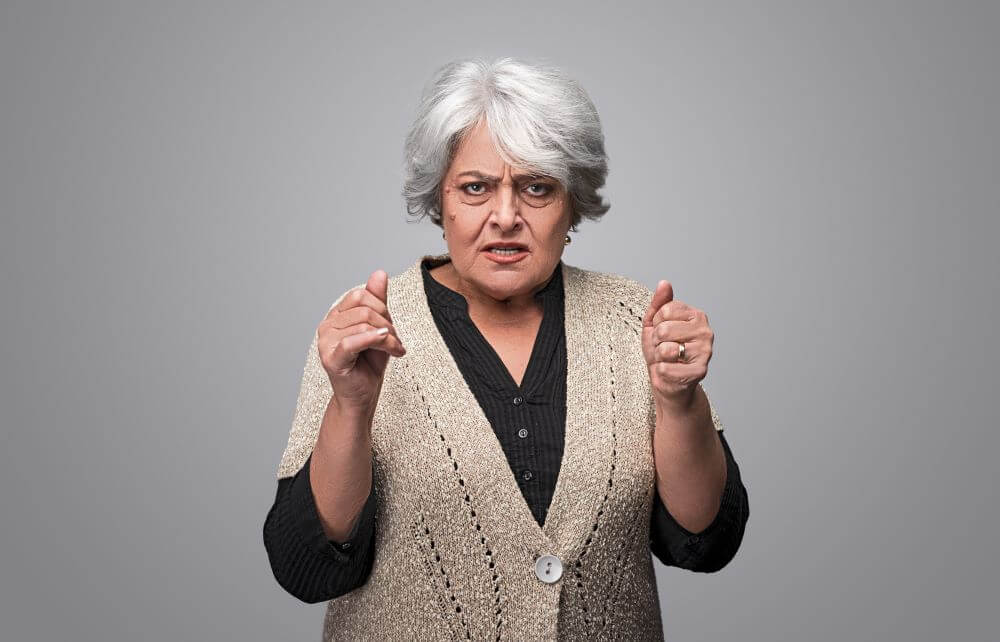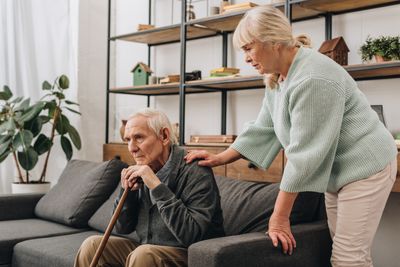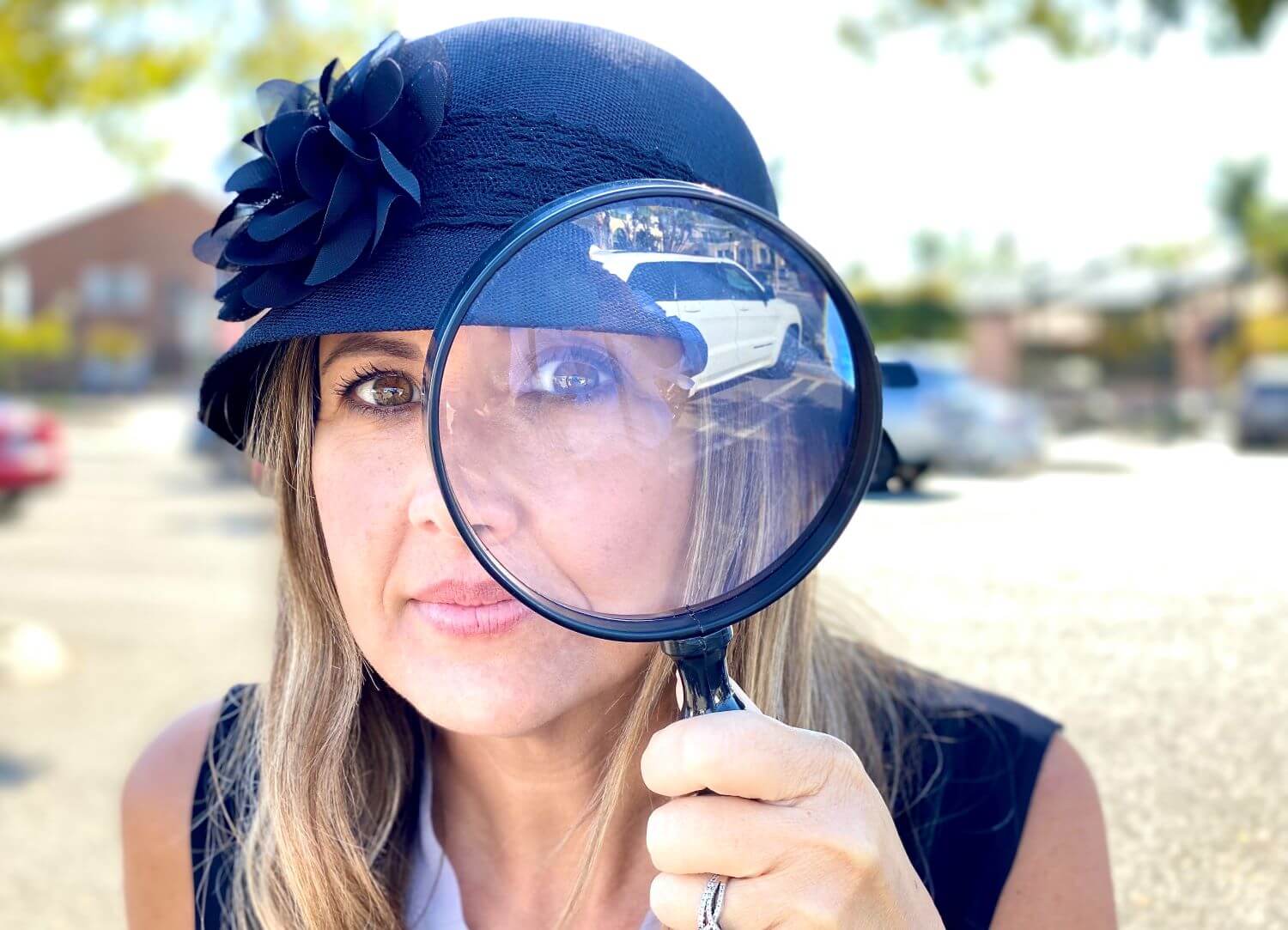
Bob had always been the friendly neighbor everyone loved. He was genuinely kind and loved chatting with people, from the grocery store cashier to anyone who passed by. Married to his beloved wife Mimi for over 50 years, he had been a loving and gentle husband.
However, when Bob was diagnosed with dementia, Mimi began noticing changes she wasn’t prepared for, especially in his moods. The once calm and loving Bob started becoming more easily agitated, showing signs of anger and frustration toward Mimi—a behavior completely out of character for him. Bob was struggling with dementia-related agitation.

What is Dementia Agitation?
According to the Medline Medical Encyclopedia, agitation is “an unpleasant state of extreme arousal.” People who are agitated may feel restless, tense, confused, or irritable. Studies suggest that up to 90% of people with dementia experience behavioral and psychological symptoms, such as agitation, aggression, and depression, at some stage.
This makes it essential for caregivers to understand what dementia agitation looks like and what might cause it.

What Causes Dementia Agitation?
As dementia progresses, the brain undergoes changes that make it harder for someone to interpret signals, communicate, and understand their surroundings. These changes can cause confusion and frustration, leading to agitation.
Here’s a list of possible triggers you can check:
- Physical Needs: Is your loved one in pain, thirsty, hungry, or needing to use the bathroom?
- Discomfort: Could there be physical discomfort, like soiled clothing, an itchy shirt, or an ingrown toenail?
- Environmental Factors: Are there changes in routine, lighting, noise, or temperature that might feel overwhelming?
- Emotional Needs: Are they feeling lonely, fearful, or in need of comfort?
Agitation is usually a sign that something is wrong. By acting as a “Dementia Detective,” you can often address the cause and reduce the behavior.

Signs of Dementia Agitation
Knowing the signs of agitation early can help prevent situations from escalating. Here are common signs to watch for:
- Pacing or restlessness
- Tensed body or clenched fists
- Face tightening, frowning, or staring
- Raising their voice or becoming argumentative
- Crying or repeating words or phrases
When you spot these signs, it’s time to pause and investigate possible causes.

When Does Agitation Usually Occur?
Agitation typically begins in the middle stages of dementia but can vary depending on the type of dementia.
For some, a calm and predictable environment may prevent agitation; for others, environmental stress can quickly lead to frustration. In later stages, agitation may progress to aggressive behaviors, especially when hands-on care is required.

Responding to Agitation: Preventing Escalation
The best approach is always prevention. Here are some practical tips:
- Understand Their Triggers: Try to identify and avoid situations that commonly lead to agitation.
- Maintain a Calm Environment: Soft tones, a steady routine, and a familiar environment can all make a big difference.
- Non-threatening Body Language: Stand sideways, not face-to-face, and keep a comfortable distance to reduce feelings of threat. Always keep 2-3 feet of space between you and the aggressive person.
- Use Reassuring Language: Simple phrases like, “I understand,” or “Everything is okay,” can help calm them down.
Interventions For Dementia Agitation
Never argue with someone with DEMENTIA!
Their reasoning ability is gone, and you will only add fuel to the fire you can’t control.
Your goal is to find the cause of the agitation and diffuse the situation.
You will find that arguing with the agitated person will cause them to become more frustrated and agitated.
Once the problem is identified and solved redirection will often eliminate the behavior.

Redirection
Once you identify the problem, try redirecting them to a new activity or topic. For instance, if someone is agitated about wanting to drive a car they no longer have, explain that it’s being repaired and then suggest watching a favorite show while waiting.
Music Therapy
Playing calm, soothing music in the background can often help reduce agitation. Experiment with different types of music to see what has the most calming effect. The more mellow the music, the stronger the calming effect is.
Services like Pandora or YouTube allow you to create playlists specifically for relaxing environments.
Aromatherapy
Lavender and lemon balm are two scents found to help with agitation in dementia. Aromatherapy can be an easy way to create a calming atmosphere, as it has been shown to reduce anxiety in studies with dementia patients.
Distraction
Distraction is often the first approach I recommend for handling agitation, especially after confirming that any physical needs are met. Shifting focus to something engaging or soothing can be a simple yet effective way to ease distress and help calm the person.
For example, I’ve often used a phone as a distraction tool. I once cared for patients who became agitated while searching for a deceased spouse, not recalling that their spouse had passed. In these situations, I found it much easier and less stressful to use distraction instead of correcting them. I’d hand them a phone, dial a number to an empty office, and let them listen to the phone ringing. The sound would keep them focused and calm for a little while, gently steering them away from their initial agitation.

Caregiver Safety & Aggression
For caregivers, safety is a top priority, especially when dealing with agitation that can sometimes escalate into aggressive behavior. It is crucial to understand that reasoning with someone who has dementia is often ineffective—their reasoning ability is gone.
Many people with dementia are moved to a nursing home because their aggression becomes too difficult to manage. Often, the spouse is the only one at home with them and may even become afraid of them, feeling they can no longer handle the aggression alone. Another concern is when a caregiver spouse is hurt by the person with dementia but feels too embarrassed to tell other family members.
All family members and friends should keep an eye out for the safety of the primary caregiver in the home.
Understanding dementia-related aggression is vital to protect both your loved one and yourself. By being proactive and involving family and friends in monitoring caregiver safety, you can build a safer, more supportive environment, as these behaviors can be both challenging and distressing.

CONSIDER medications
If non-medical strategies aren’t reducing the aggression, it may be time to discuss medication options with the doctor. Medications can sometimes help manage severe aggression, but it’s important to know that finding the right approach may take some time and adjustments.
-
Types of Medications: Doctors may consider different classes of medications based on the specific symptoms and severity of aggression. These may include antipsychotics, mood stabilizers, or even certain types of antidepressants that can have calming effects. Each medication comes with potential benefits and side effects, so it’s essential to stay informed.
-
Trial and Adjustment: It may take several attempts to find the most effective medication at the right dose. Sometimes, a trial period is needed to see how well a medication works, and doses may need adjusting. It’s also common for doctors to start at a low dose and increase gradually to minimize side effects.
-
Close Monitoring: Keep a close eye on your loved one’s response to the medication. Use a tool like the Alzlog app to track any changes in behavior, side effects, and overall mood. This information is valuable for follow-up appointments and helps the doctor make any necessary adjustments to the treatment.
-
Safety Considerations: Medications used to manage aggression in dementia can carry some risks, particularly in older adults. Be sure to understand any potential side effects, such as drowsiness, increased confusion, or balance issues that could lead to falls. Open communication with the doctor about these concerns is essential.
By working closely with the doctor and tracking your loved one’s responses, you can help create a safer environment while addressing severe aggression. Medications are not a one-size-fits-all solution, but they can be an important part of the care plan for managing challenging behaviors.











0 Comments